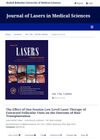 1 citations,
July 2017 in “Global journal of pharmacy & pharmaceutical sciences”
1 citations,
July 2017 in “Global journal of pharmacy & pharmaceutical sciences” A new hair loss treatment was created using minoxidil and tretinoin in stable niosomes, which effectively released the drugs over time.
May 2023 in “Clinical, Cosmetic and Investigational Dermatology” More personalized and effective treatments for androgenetic alopecia are needed.
 January 2023 in “Springer eBooks”
January 2023 in “Springer eBooks” New understanding of hair loss could lead to better treatments.
January 2022 in “Advances in Clinical Medicine” December 2021 in “Journal of V. N. Karazin Kharkiv National University: Series Medicine” The treatment improved hair health in women with androgenetic alopecia.
January 2020 in “Global dermatology” The growth factor cocktail significantly increased hair growth in patients with androgenetic alopecia.
 42 citations,
August 2013 in “International Journal of Women's Health”
42 citations,
August 2013 in “International Journal of Women's Health” Female pattern hair loss is caused by multiple factors and while treatments like topical minoxidil, hormone therapy, and low-level light therapy can help, none can fully cure it.
31 citations,
July 2021 in “ImmunoTargets and therapy” Alopecia areata is an incurable autoimmune condition causing hair loss, with research aiming for better treatments.
20 citations,
March 2021 in “Drug design, development and therapy” Topical immunotherapy can treat alopecia areata, but its effectiveness varies and the exact mechanism is unclear.
14 citations,
September 2021 in “Journal of Inflammation Research” Alopecia areata patients, especially women with nail issues or atopic diseases, are at higher risk for other autoimmune diseases.
11 citations,
March 2021 in “Cleveland Clinic Journal of Medicine” Treating hair loss in both men and women is effective and improves quality of life.
 6 citations,
January 2021 in “Annals of Dermatology”
6 citations,
January 2021 in “Annals of Dermatology” 650 nm red light helps hair grow and prevents hair loss by affecting certain genes and biological processes.
 6 citations,
January 2016 in “Journal of lasers in medical sciences”
6 citations,
January 2016 in “Journal of lasers in medical sciences” One session of Low Level Laser Therapy before hair transplantation doesn't significantly improve hair growth.
 4 citations,
December 2016 in “Medical lasers”
4 citations,
December 2016 in “Medical lasers” Lasers can be effective for treating hair loss from alopecia areata.
2 citations,
September 2022 in “American Journal of Clinical Dermatology”  2 citations,
February 2021 in “The Journal of clinical and aesthetic dermatology”
2 citations,
February 2021 in “The Journal of clinical and aesthetic dermatology” Understanding the cause of bitemporal hair loss is key to deciding the right treatment.
2 citations,
September 2019 in “Springer eBooks” 1 citations,
July 2022 in “JEADV Clinical Practice” New and existing treatments for hair loss show promise, with some being more effective for men and others for women.
 1 citations,
September 2019 in “Springer eBooks”
1 citations,
September 2019 in “Springer eBooks” Telogen effluvium is a condition that causes temporary hair loss due to stress or shock to the body.
 1 citations,
July 2017 in “Clinical research in dermatology”
1 citations,
July 2017 in “Clinical research in dermatology” Hair loss, known as Androgenetic Alopecia, is often caused by hormones and can be diagnosed using noninvasive techniques. Treatments include topical minoxidil and oral finasteride, with new treatments being explored. There may also be a link between this type of hair loss and heart disease risk.
August 2024 in “Journal of Clinical Medicine” Low-level laser therapy is the most supported treatment for hair loss, but other methods show promise.
 July 2024 in “Clinical Cosmetic and Investigational Dermatology”
July 2024 in “Clinical Cosmetic and Investigational Dermatology” Non-drug therapies show promise for hair regrowth but need more research.
 February 2024 in “Actas Dermo-Sifiliográficas”
February 2024 in “Actas Dermo-Sifiliográficas” Dermatologists recommend oral dutasteride for male hair loss, low-dose oral minoxidil for female hair loss, and a multidisciplinary approach for young patients, with caution during pregnancy.
 January 2024 in “Annals of Agricultural and Environmental Medicine”
January 2024 in “Annals of Agricultural and Environmental Medicine” Red LED light therapy helps reduce hair loss and improves hair regrowth in long COVID patients.
 December 2023 in “European Journal of Medicinal Chemistry”
December 2023 in “European Journal of Medicinal Chemistry” Natural products might be safe, effective, and affordable treatments for hair loss.
 November 2023 in “Journal of Student Research”
November 2023 in “Journal of Student Research” New treatments like low-level laser therapy, platelet-rich plasma therapy, and micro needling show positive results for hair regrowth in people with genetic hair loss.
 November 2023 in “International Journal of Medical Sciences”
November 2023 in “International Journal of Medical Sciences” New regenerative medicine-based therapies for hair loss look promising but need more clinical validation.
 November 2023 in “Materials Today Bio”
November 2023 in “Materials Today Bio” Light therapy might help treat hereditary hair loss by improving hair follicle growth in lab cultures.
 September 2023 in “Forum Dermatologicum”
September 2023 in “Forum Dermatologicum” Various treatments for common hair loss in men and women are effective, but should be tailored to individual needs and potential side effects.
 April 2023 in “Journal of Cutaneous and Aesthetic Surgery”
April 2023 in “Journal of Cutaneous and Aesthetic Surgery” Using different hair loss treatments at various times can improve results and reduce side effects for people with chronic hair loss.

















